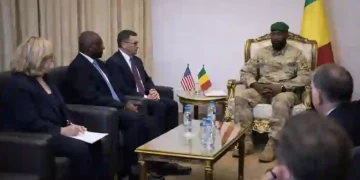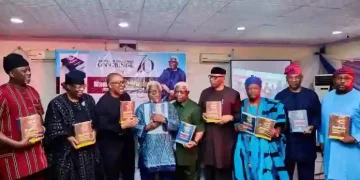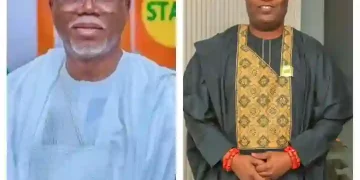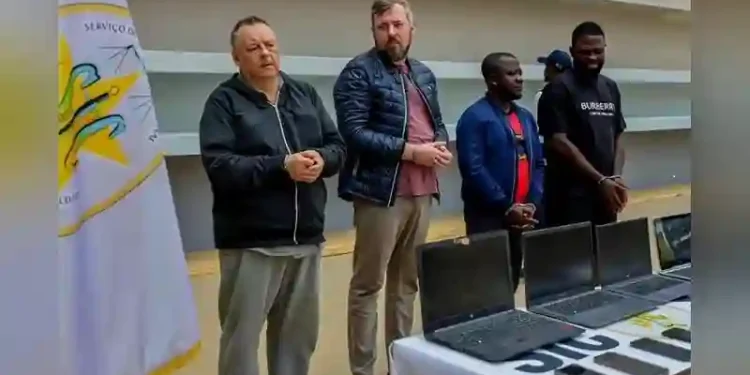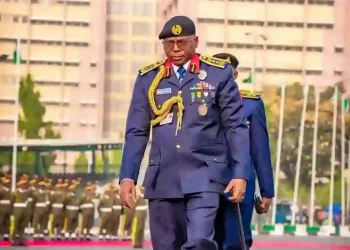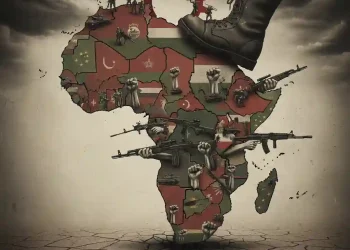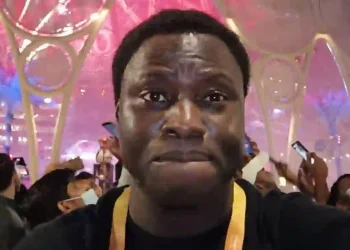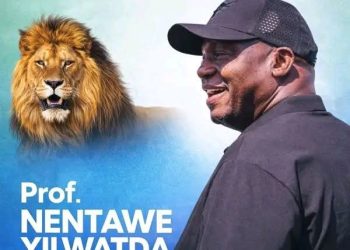It began not with a bang, but with a flag. In August 2024, on the sun-baked streets of Kano, Nigeria, a protest against economic hardship took a bizarre turn. Amid the crowd, the white, blue, and red of the Russian flag fluttered unexpectedly, a stark symbol of a discontent that was being subtly redirected. This was not an isolated incident. It was the faint echo of a strategy that had rumbled across the Sahel, toppling democracies and drawing a new, alarming geopolitical map. Now, that echo has reached Africa’s giant, and Nigeria is watching with growing apprehension as an arc of instability tightens around its borders.

Protesters in Kano, waving the Russian Flag during the August 2024 nationwide Protest
To understand the threat, one must look south to Angola. There, on August 7, 2025, a dramatic arrest in the capital, Luanda, pulled back the curtain on Moscow’s new, more subtle toolkit for destabilisation.
Lev Lakshtanov, a 64-year-old Russian, presented himself as a man of culture. He was the founder of FAROL, an NGO fostering ties with Portuguese-speaking countries, backed by Rossotrudnichestvo, Russia’s official cultural diplomacy agency. He arrived on a tourist visa, a seemingly harmless academic. But his companion, Igor Racthin, was a ghost, a man with no digital footprint, suggesting a carefully constructed alias.
Posing as journalists, they ingratiated themselves with Angola’s main opposition party, UNITA. They conducted paid interviews, commissioned opinion polls on Russia, and spoke of opening a cultural centre. But according to Angolan authorities, their real mission was far darker: to mastermind a network of propaganda and disinformation, bankrolling and stirring violent fuel price protests. They now face charges of terrorism, criminal association, and terrorist financing.
The Russian citizens are operatives for the organisation Africa Politology, whose activities, among other missions, aim to promote disinformation campaigns, manipulate local media, and infiltrate political processes, particularly in the promotion of subversion.
They provide large sums of money, in both national and foreign currencies, to journalists, politicians, professional associations, and digital content producers to support their activities.
“This is the new face of Russian hybrid warfare in Africa,” explains a West African political analyst who spoke to ApplesBite Magazine on condition of anonymity due to the sensitivity of the topic. “It’s no longer just about burly mercenaries. It’s about ‘political technologists’ who use soft power as a weapon. They identify local grievances, like fuel prices or government corruption, and pour digital gasoline on the fire, directing the flames against Western influence and towards the Kremlin.”
Dr. Godspower Oshodin, a Nigerian Public Affairs analyst based in London, puts it bluntly: “Russia’s playbook is to weaponize our frustrations. Nigeria must be wise enough not to mistake the arsonist for a firefighter.” He argues that the core of Nigeria’s vulnerability lies in its internal divisions. “Our defence,” he adds, “must therefore be equally sophisticated, rooted in transparent governance and a proactive media strategy that wins the trust of our own people before outsiders can steal it.”
The parallels to Chad are chilling. Just a year earlier, in September 2024, a similar group of Russians and a Belarusian were arrested in N’Djamena. They too posed as investors and journalists, recruiting locals to publish pro-Russian articles for cash. Their activities were centred around the inauguration of another Rossotrudnichestvo cultural centre.
While Angola foiled the plot, the success of this strategy is already evident just north of Nigeria’s border. In Niger, Mali, and Burkina Faso, the sequence was tragically predictable: Russian flags appeared at protests, followed by military coups that ousted governments often critical of Moscow. The Russian private military company Wagner, now rebranded as the state-controlled Africa Corps, moved in, offering security in exchange for strategic resources like gold and uranium.
Nigeria’s Minister for Foreign Affairs, Yusuf Tuggar, recently articulated the nation’s deep concern during a live interview with Arise TV.
“With the Russian involvement and creation of African Corps is something of great concern to Nigeria, because it will further destabilize Africa,” Minister Tuggar stated. “Because you can see that with the involvement of Russia and a private military company in the Central African Republic, and now their involvement with Niger, Burkina Faso, and Mali, you can see that it will create an arc around Nigeria. The only missing link now in the puzzle is Chad, and we are quite concerned about that.”
Nigeria, Africa’s most populous nation and its largest economy, now finds itself potentially encircled by a ring of military-run states increasingly under Moscow’s influence. The fear is that the script written in Bamako, Ouagadougou, and Niamey, where pro-Russian sentiment paved the way for coups, could soon have a new, devastating chapter set in Abuja if care is caution taken.
For Nigeria, the implications are existential. To the north-west, Niger is firmly in the new junta bloc. To the north-east, Chad is the precarious “missing link” that Minister Tuggar fears. If Chad were to fall into the same pattern, Nigeria would be completely surrounded on its northern flank by nations aligned with a power that has demonstrated a clear playbook for undermining sovereign, democratic governments.
“The Kano protest last year was a canary in the coal mine,” the analyst opined. “It shows that the narrative is already seeping across the border. The message is simple and potent: ‘Your government has failed you; the West has abandoned you; only Russia offers a strong alternative.’ This message resonates powerfully in regions plagued by insecurity and economic hardship.”
The Nigerian government’s response in Kano—arresting the flag-wavers and the tailor who sewed the banners—betrays a recognition of the threat at the gate. However, experts warn that a purely security-based response is inadequate against an information war.
Sovereignty at Stake
The arrests in Angola and Chad reveal a sophisticated, multi-pronged strategy. It combines the hard power of the Africa Corps with the soft, subversive power of networks like ‘Africa Politology’. They use cultural diplomacy as a Trojan horse, media manipulation as a weapon, and economic discontent as fuel.
For Nigeria, the lesson is clear: the battle for its sovereignty will not only be fought against terrorists in the Sambisa Forest but also in the digital space and the hearts and minds of its citizens. The objective of these campaigns is to erode trust in democratic institutions, create chaos, and open the door for a change in governance that benefits the Kremlin’s strategic goals at the expense of African self-determination.
“What happened in Angola is a successful counter-operation,” the analyst concludes. “It shows that with intelligence and political will, these networks can be exposed. Nigeria must invest heavily in its own counter-narrative, in shoring up good governance to remove the grievances these actors exploit, and in regional diplomacy to stabilise Chad. The warning from the Foreign Minister is not alarmist; it is a necessary and urgent call to action. The shadow war is here, and Nigeria is in the crosshairs.”
The flag in Kano was a signal, and the arrests from Luanda to N’Djamena are the blueprint. Nigeria has been put on notice. The nation now stands at a precipice, facing a war of perception where its democratic resilience will be tested as never before. The question is no longer if the threat is real, but whether Africa’s giant can muster the unity and strategic foresight to defend its future before the noose tightens completely.

